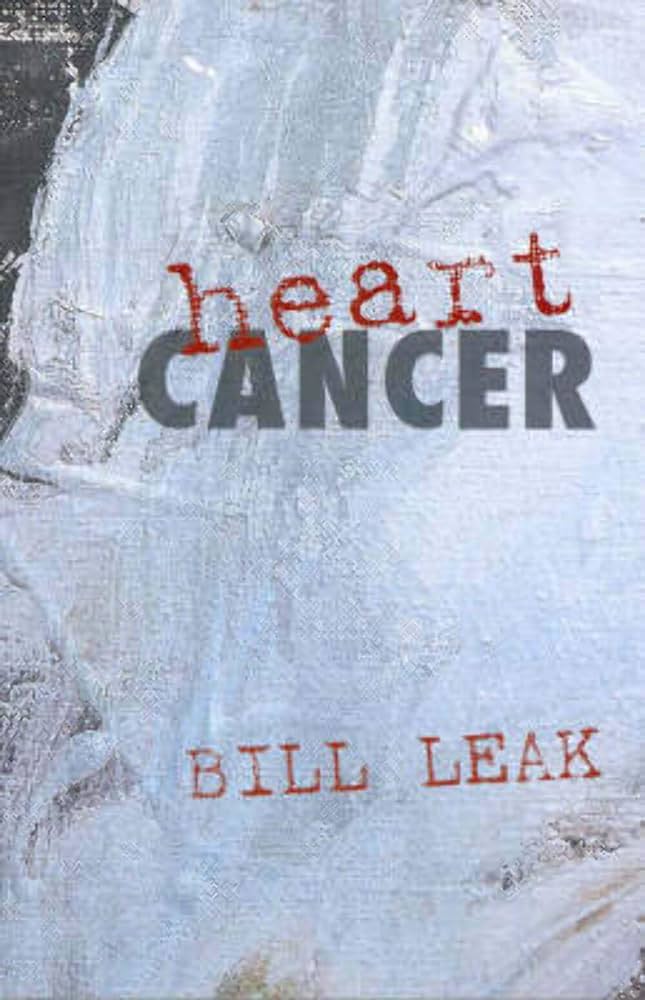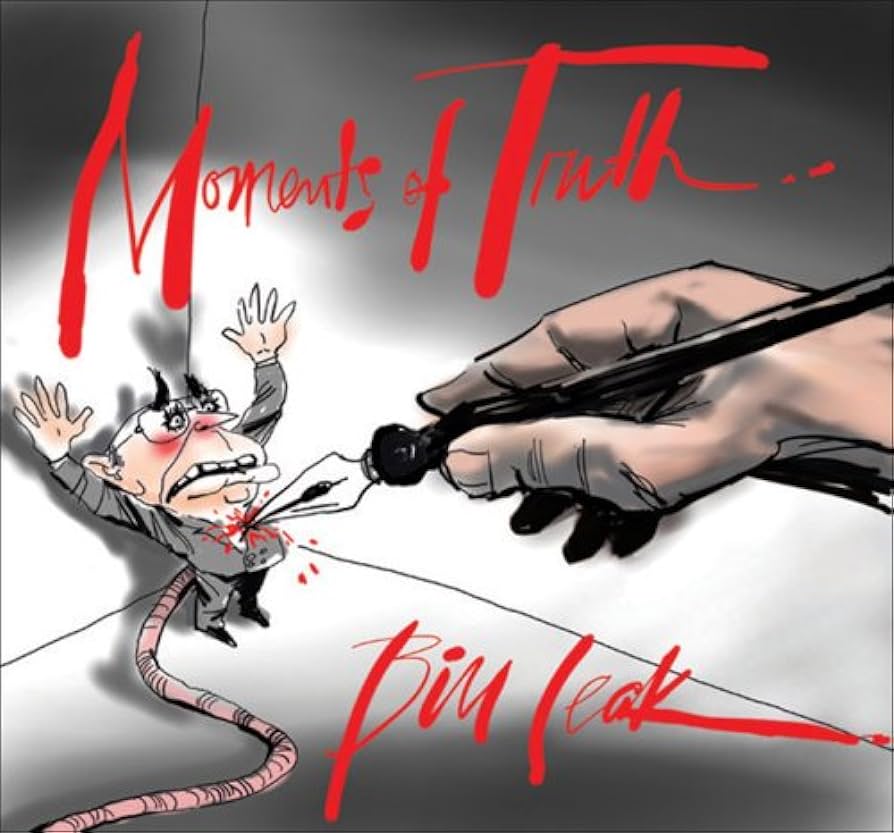
- Free Article: No
- Contents Category: Fiction
- Review Article: Yes
- Article Title: Fine lines
- Online Only: No
- Custom Highlight Text:
Bill Leak’s first novel, Heart Cancer, is a quasi-picaresque larrikin’s progress that unexpectedly turns into a tale about addiction and self-destruction. It is an enterprising book, but Leak has the difficulty any novelist might in getting the two tones – the comic and the serious – properly balanced.
- Book 1 Title: Heart Cancer
- Book 1 Biblio: ABC Books, $29.95 pb, 282 pp, 073331631X
- Book 1 Cover Small (400 x 600):

- Book 1 Cover (800 x 1200):

- Book 2 Title: Moments Of Truth
- Book 2 Biblio: Scribe, $39.95 pb, 186 pp, 1920769536
- Book 2 Cover Small (400 x 600):

- Book 2 Cover (800 x 1200):

There are some nice touches. Important events, such as the death of Frank’s mother, happen offstage, in the gaps between each of the book’s four sections. Frank, like Xin-Xin, is a crossword fan and he courts her by email in a series of cryptic clues, taking off from the title of Xin-Xin’s novel, Lost Sheep. The last-minute attempts of Frank’s sister Nina to gain refuge for herself and her daughter Mandy from a drunken and abusive husband are cross-cut with one of Frank’s cocaine-fuelled seduction attempts.
The novel lures us into reading Frank as a celebration of hard drinking, whoring, fighting, but basically authentic Australian masculinity, only to confront us with the self-destructiveness of such behaviour. Frank worships Goya, and Goya serves as constant reminder of the dark side of life. Unfortunately, the references to Goya’s darkness aren’t brought into full narrative focus. Now and then they evaporate into silliness. On a visit to the Prado, Frank stands Xin-Xin in front of Goya’s The Pilgrimage of Saint Isidro. ‘What’s it saying to you?’ Frank whispers. ‘Hello from Hell,’ says Xin-Xin.
Xin-Xin, the heroine and saviour, is a real problem. She turns out to be that old male fantasy figure, the perfect woman, updated with a nod towards contemporary values. As well as being an award-winning novelist (the quotations from her novels cast doubt on the likelihood of this), she has degrees from Sydney and Columbia, and is incredibly beautiful with, according to Frank, only two of the twenty possible forms of body hair. She is patient, adaptable, and sympathetic. An accomplished cook, she is shown at one point about to produce, ‘with little apparent effort’, suckling pig for a dinner party. Told by Philip, her (at this point) muesli-eating academic partner, that she can’t serve pork because one of the guests is Jewish, Xin-Xin drops the suckling pig idea and heads out, perhaps in an act of unconscious revenge, to buy some seafood. Xin-Xin uncannily shares all Frank’s tastes in drink, jazz and art. Testing her, Frank asks if his friend Arthur Blackwell’s paintings remind her of anyone else’s. ‘Careful, Xin-Xin,’ he thinks, ‘if you say Lovis Corinth I’m going to marry you.’ ‘Lovis Corinth,’ says the reliable Xin-Xin. Xin-Xin disapproves mildly of Frank’s cocaine habit, but you want her and Frank to disagree seriously about something big once in a while. The only flaw I could spot, other than perfection itself, was that she carries around signed copies of her own novels which she drops surreptitiously into the bags of people who might be interested in her.
The book demonstrates that it is easier to be serious than to be funny. Much of the comedy is flat-footed: witness the running jokes about feng shui. ‘Hmm, smells like feng shui,’ says Frank on one occasion, in anticipation of Xin-Xin’s cooking. In a typical episode, Frank, angry with his boss, Harry, steals Harry’s favourite pipe, and photographs it sticking out of his own anus. He then returns the pipe, following it up later with the photographs. Leaving aside credibility, lack of originality, or what it tells you about Frank, this struggles as comedy.
There is much use of the word ‘fuck’ and its derivatives (an overuse that spoils the few potentially funny fuck-word jokes), yet the novel’s default language position is strangely genteel. Menus are ‘perused’, drinks get ‘quaffed’ and someone gives Frank ‘a conspiratorial grin’. Frank even thinks – thinks, mind you – ‘Phew!’. There is some alliterative nonsense about ‘people who packed off their pampered progeny to expensive private schools’, and lots of jocular circumlocution, such as ‘Frank’s concept of what constituted a building’, ‘had attained as much height’, ‘had achieved bloatedness’. Far-fetched comparisons supposed to illuminate the reader’s sense of what is going on cast things into an even deeper obscurity: ‘When the English Egyptologist Howard Carter entered the tomb of Tutankhamen in 1922, he had an expression on his face which was unique in human history until, in 1997, it appeared again on Barry O’Connor’s when he entered Arthur Blackwell’s Studio in Surry Hills.’ Absent is the precision of utterance that comedy needs.
Leak’s cartoons tell a very different story. His collection Moments of Truth – a cartoon survey of the years 2001–04 – opens the way to an airier and more invigorating world. Line is the cartoonist’s equivalent of language, and no one can have any doubts about Leak’s line. He is a master draftsman and a pitiless caricaturist. The book is a gallery of brilliant and devastating portraits often finessed into witty and telling visual jokes. There is a wonderful drawing of John Howard, ‘In the Liberal Ward’, standing before a curtain drawn across a hospital bed, a proud father displaying his newborn-nine-dollar-a-week-tax-cut baby to a crowd of photographers. Behind the curtain, ignored by everyone, lies the exhausted and grumpy mother, Peter Costello. Leak hates Howard and his cronies, Philip Ruddock especially. ‘How do you draw a man without a soul?’ he asks, helplessly. In fact he does an excellent job.
In the case of the Liberals, it is anger that fuels the revenge of caricature, but really good jokes about them are thin on the ground. Leak is actually funnier on the Labor party, as if humour requires something more conflicted than hatred: in this case, attachment, hope abandoned, an eye that cannot turn away from repeated failure and incompetence, no matter how painful the sight. He draws Kim Beazley beautifully as Howard’s bouncer at ‘Club Australia’, and there is some sort of pleasure in seeing once more that masterpiece of humiliation, the ‘two dogs fucking’ cartoon about Simon Crean. I especially admired ‘Trussed’, a wonderful drawing of Mark Latham, helplessly suspended and caught up in the ropes of his family tax policy, angry, frustrated and impotent, shouting: ‘Look –– it’s not that complicated …’ Drawings like these cut to the contemporary bone in a way that Leak’s prose never does.
As is customary in such publications, none of these cartoons, bar one or two, is dated. This is a mistake. If cartoons form, as the blurb says they do, a ‘counter-history’ of our times, and as that counter-history registers everything at the level of daily events, then the reader is going to need those dates, the more so as the events themselves fade into the past. As commentary, Leak has added a few observations of his own here and there, and a number of lively quotations from figures as different as Gore Vidal and Hermann Goering. The book is beautifully produced, with 250-odd cartoons, perhaps two-thirds in full colour, which only makes the absence of dates – of a history – more of a pity.


Comments powered by CComment